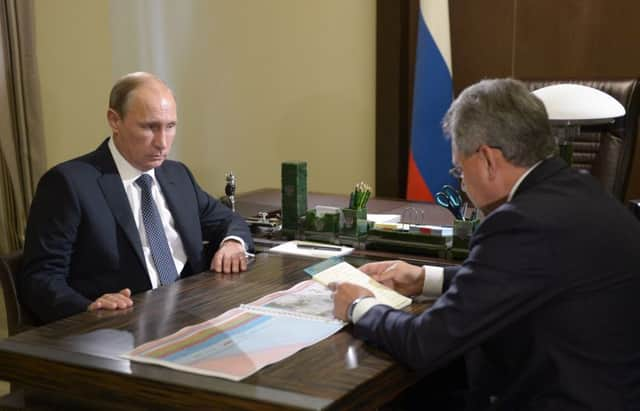Leaders: Russia plays a dangerous, long-term game


Should we be worried about the Russian escalation in Syria? There will be some who think that at least Russia appears to be serious in its stated intention of taking the war to Islamic State, with its cruise missile attacks backing its air attacks and the build up of naval resources in the eastern Mediterranean.
Surely we should welcome any and all who want to wage war on the murderous group, because after all my enemy’s enemy is my friend?
Advertisement
Hide AdAdvertisement
Hide AdBut the difficulty is that Russia is not waging war on Islamic State. The attacks it has been carrying out in the north west of the war-torn country are in an area where Islamic State does not operate. The groups who do operate there are in fact fighting the Assad regime, some with Western backing. Russia, of course, is a stated ally of President Bashar Al Assad.
Now the Syrian army is undertaking its first major ground offensive in months in the area the Russians have been attacking. Normal military operations of this kind would require communication between air and ground attackers, but it may be in this case that the Syrian army is just seizing the opportunity.
But Assad is not the only ally Russia has or is courting in the area. The cruise missiles that were fired from the Russian navy vessels in the Caspian Sea are believed to have taken a somewhat circuitous route to their targets in Syria, over Iran and Iraq, and thankfully avoiding Turkey.
Iran is also an ally of Assad and is involved in combat operations against Islamic State. Iraq, already hugely engaged in the fight against Islamic State which now holds large parts of the country, has already said that it would welcome Russian aid and the prospect of deploying his forces from Iraq must be very appealing to Mr Putin, especially as a welcome ally.
With Russian aircraft apparently violating Turkish airspace without a second thought, it is easy to see why the Nato member is unhappy with this ramping up of military activity.
And obviously Turkey is not the only Nato member worried at the increasingly aggressive and open movement of forces that Putin is carrying out. Hence Defence Secretary Michael Fallon’s decision to send troops to Poland and the Baltic states of Latvia, Lithuania and Estonia.
That small number of British troops is a drop in the ocean compared with what Mr Putin is up to, but their significance lies not in their number or military effectiveness but in the signal it sends to Russia of British investment and intent.
But it appears Russia is playing a bigger, more long-term game here. Putin may be accused of taking sides in the deep internal division of the Muslim world as by falling in with Assad, Iran and Iraq he is lining up with those largely Shia regimes against the Sunnis. That could be a dangerous place for Russia to be, but it could be disaster if the West took up an opposing stance and we have to be careful to avoid that potentially catastrophic polarisation.
Advertisement
Hide AdAdvertisement
Hide AdBut for now a Russian military presence in Syria and Iraq will certainly be seen as a further expansion and the arms build-up in the area is an escalation. The West must realise the direction that Putin is travelling in and bring all diplomatic and trade pressure to bear to get him to stop and rethink before it becomes too late.
No smoke without ire
Passing laws to force parents to become better parents is a difficult and contentious issue.
There is very definitely a line that can be crossed when it comes to state intervention in to parenting practices and the question is whether stopping children being exposed to cigarette smoke in cars by criminalising the perpetrators in fact crosses that line.
Laws that parents have to follow are not without precedent – all parents must by law ensure their children get an education, and who can forget the controversy around ending corporal punishment of children. That ended up outlawing hitting children on the head, shaking, or punishing with a belt, cane or other implement. Smacking, as a disciplinary measure and within reason, is not a criminal offence.
That might on the face of it seem contradictory, that a parent can hit a child but not smoke in its presence in a car. Then there are the wider implications – does this mean that outlawing smoking in the home in the same room as a child would be the next step?
And then, if we do legislate to promote the health of children, should people who feed their children too much, or too much fat, or not enough vegetables, also be liable to prosecution.
There is probably now exists enough reliable technology to ensure that the tablet every primary school pupil should justly receive from the government will be able to give evidence of movement and exercise, and those not working out could see their parents punished. Some children might like that.
But putting these absurd scenarios aside, let us concentrate on the art of the possible. Smoke harms children, and if we can stop that we should. And stopping it in cars is actually quite an easy thing to do, so we should.